BUSN20017: Reflective Essay on Developing Business Communication
VerifiedAdded on 2023/06/03
|10
|2633
|144
Essay
AI Summary
This essay reflects on the significance of communication in business, highlighting key concepts learned over ten weeks, including interpersonal and intrapersonal communication, the listening process, written and verbal communication, sentence construction, literature review writing, communication apprehension, intercultural and organizational communication, team dynamics, and assertive communication. It provides a literature review on intercultural communication, emphasizing its importance in a diverse workplace for enhancing productivity, fostering positive relationships, and providing a global business edge. The essay further discusses the importance of listening skills and intercultural communication for future career aspirations, particularly in a management role, to build trust, resolve conflicts, and promote a healthy work environment. The conclusion underscores the critical role of effective communication in improving organizational performance and employee efficiency.
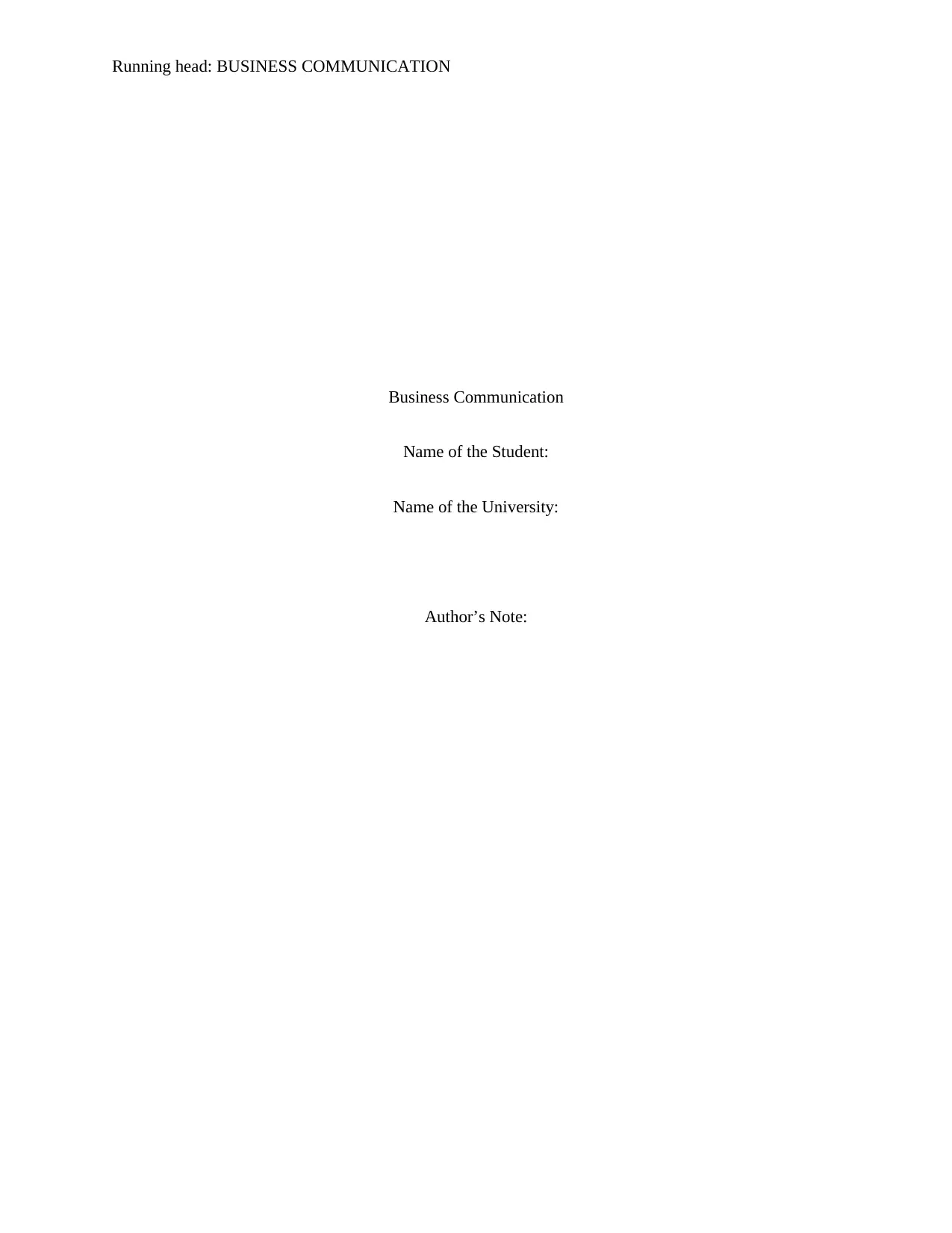
Running head: BUSINESS COMMUNICATION
Business Communication
Name of the Student:
Name of the University:
Author’s Note:
Business Communication
Name of the Student:
Name of the University:
Author’s Note:
Paraphrase This Document
Need a fresh take? Get an instant paraphrase of this document with our AI Paraphraser
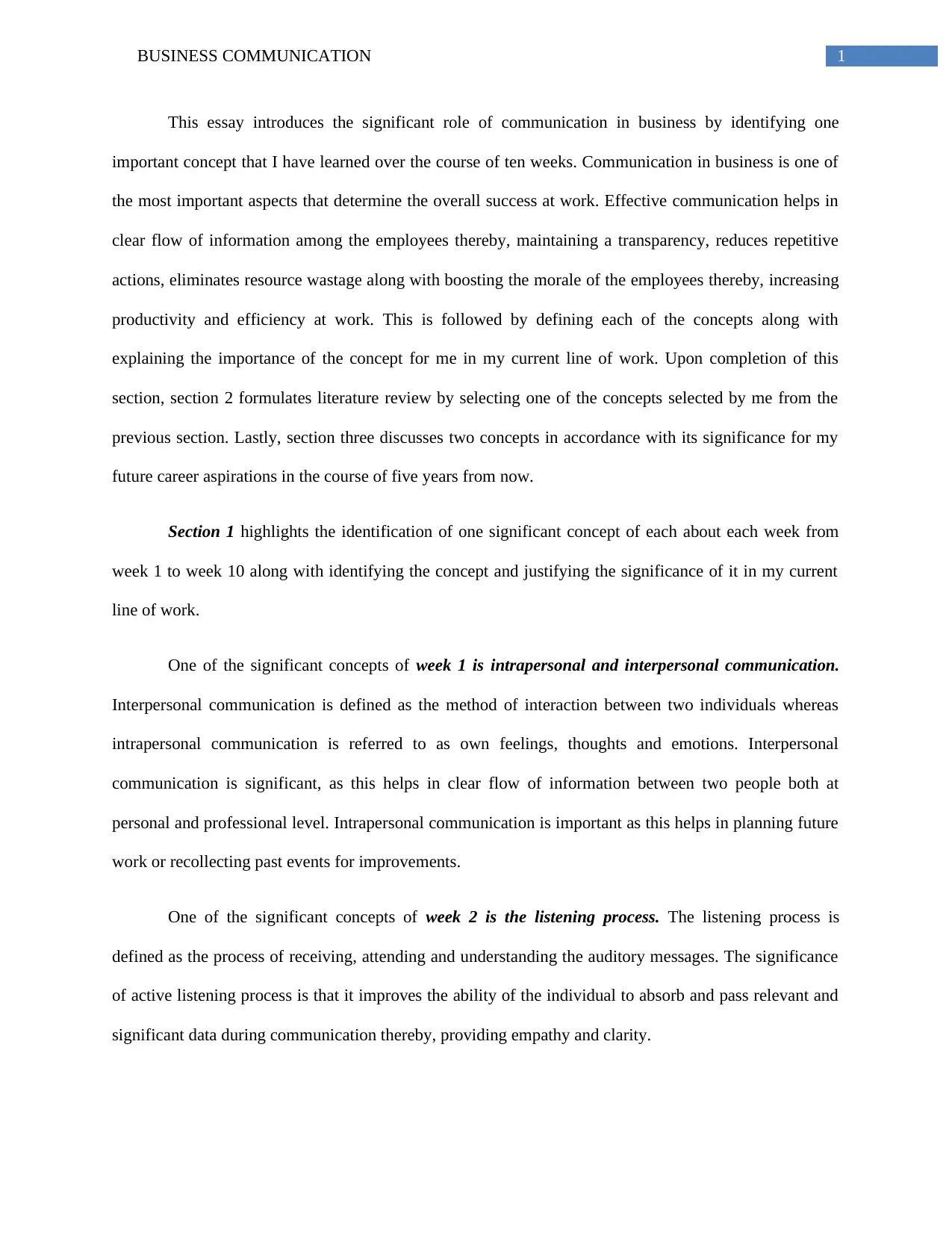
1BUSINESS COMMUNICATION
This essay introduces the significant role of communication in business by identifying one
important concept that I have learned over the course of ten weeks. Communication in business is one of
the most important aspects that determine the overall success at work. Effective communication helps in
clear flow of information among the employees thereby, maintaining a transparency, reduces repetitive
actions, eliminates resource wastage along with boosting the morale of the employees thereby, increasing
productivity and efficiency at work. This is followed by defining each of the concepts along with
explaining the importance of the concept for me in my current line of work. Upon completion of this
section, section 2 formulates literature review by selecting one of the concepts selected by me from the
previous section. Lastly, section three discusses two concepts in accordance with its significance for my
future career aspirations in the course of five years from now.
Section 1 highlights the identification of one significant concept of each about each week from
week 1 to week 10 along with identifying the concept and justifying the significance of it in my current
line of work.
One of the significant concepts of week 1 is intrapersonal and interpersonal communication.
Interpersonal communication is defined as the method of interaction between two individuals whereas
intrapersonal communication is referred to as own feelings, thoughts and emotions. Interpersonal
communication is significant, as this helps in clear flow of information between two people both at
personal and professional level. Intrapersonal communication is important as this helps in planning future
work or recollecting past events for improvements.
One of the significant concepts of week 2 is the listening process. The listening process is
defined as the process of receiving, attending and understanding the auditory messages. The significance
of active listening process is that it improves the ability of the individual to absorb and pass relevant and
significant data during communication thereby, providing empathy and clarity.
This essay introduces the significant role of communication in business by identifying one
important concept that I have learned over the course of ten weeks. Communication in business is one of
the most important aspects that determine the overall success at work. Effective communication helps in
clear flow of information among the employees thereby, maintaining a transparency, reduces repetitive
actions, eliminates resource wastage along with boosting the morale of the employees thereby, increasing
productivity and efficiency at work. This is followed by defining each of the concepts along with
explaining the importance of the concept for me in my current line of work. Upon completion of this
section, section 2 formulates literature review by selecting one of the concepts selected by me from the
previous section. Lastly, section three discusses two concepts in accordance with its significance for my
future career aspirations in the course of five years from now.
Section 1 highlights the identification of one significant concept of each about each week from
week 1 to week 10 along with identifying the concept and justifying the significance of it in my current
line of work.
One of the significant concepts of week 1 is intrapersonal and interpersonal communication.
Interpersonal communication is defined as the method of interaction between two individuals whereas
intrapersonal communication is referred to as own feelings, thoughts and emotions. Interpersonal
communication is significant, as this helps in clear flow of information between two people both at
personal and professional level. Intrapersonal communication is important as this helps in planning future
work or recollecting past events for improvements.
One of the significant concepts of week 2 is the listening process. The listening process is
defined as the process of receiving, attending and understanding the auditory messages. The significance
of active listening process is that it improves the ability of the individual to absorb and pass relevant and
significant data during communication thereby, providing empathy and clarity.
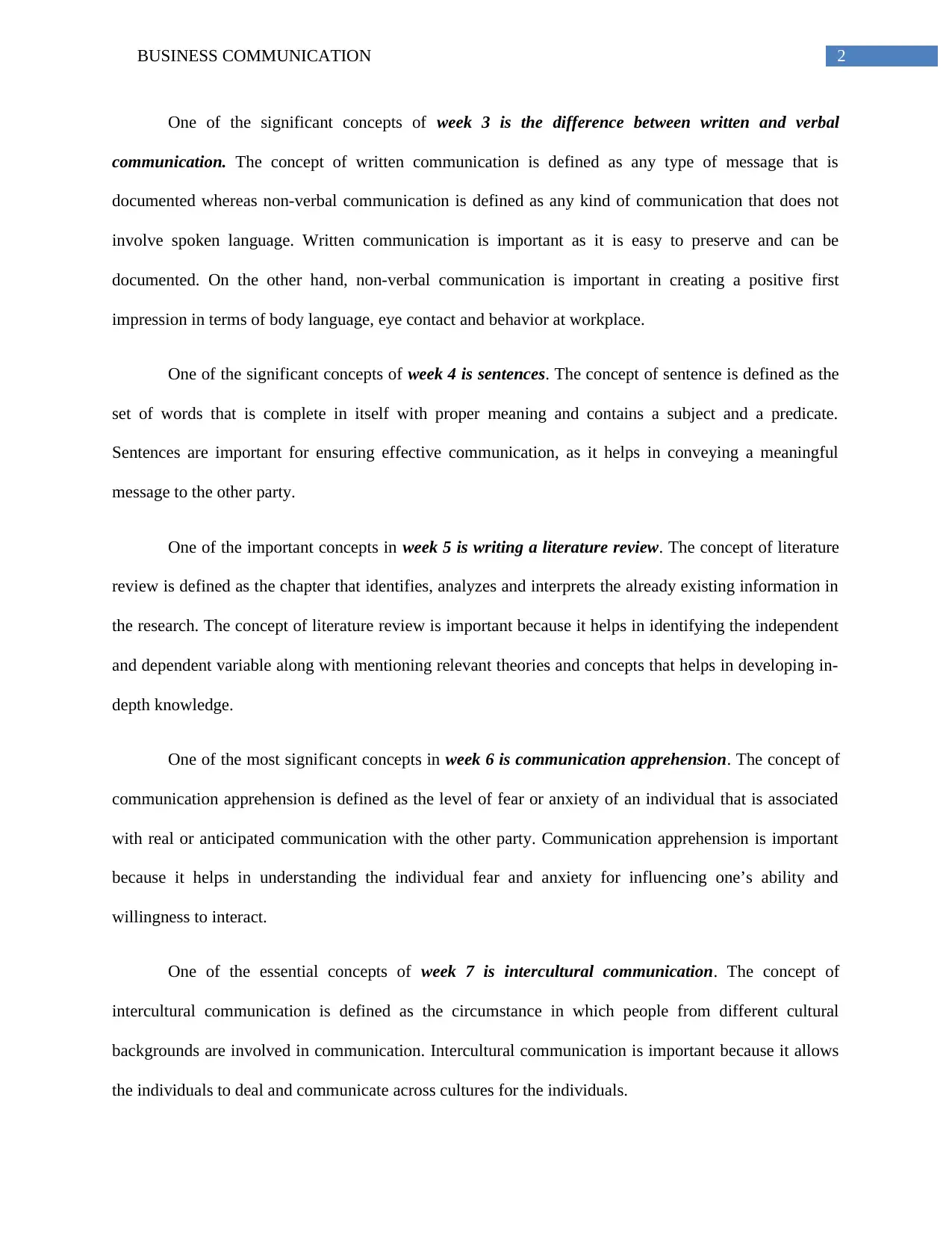
2BUSINESS COMMUNICATION
One of the significant concepts of week 3 is the difference between written and verbal
communication. The concept of written communication is defined as any type of message that is
documented whereas non-verbal communication is defined as any kind of communication that does not
involve spoken language. Written communication is important as it is easy to preserve and can be
documented. On the other hand, non-verbal communication is important in creating a positive first
impression in terms of body language, eye contact and behavior at workplace.
One of the significant concepts of week 4 is sentences. The concept of sentence is defined as the
set of words that is complete in itself with proper meaning and contains a subject and a predicate.
Sentences are important for ensuring effective communication, as it helps in conveying a meaningful
message to the other party.
One of the important concepts in week 5 is writing a literature review. The concept of literature
review is defined as the chapter that identifies, analyzes and interprets the already existing information in
the research. The concept of literature review is important because it helps in identifying the independent
and dependent variable along with mentioning relevant theories and concepts that helps in developing in-
depth knowledge.
One of the most significant concepts in week 6 is communication apprehension. The concept of
communication apprehension is defined as the level of fear or anxiety of an individual that is associated
with real or anticipated communication with the other party. Communication apprehension is important
because it helps in understanding the individual fear and anxiety for influencing one’s ability and
willingness to interact.
One of the essential concepts of week 7 is intercultural communication. The concept of
intercultural communication is defined as the circumstance in which people from different cultural
backgrounds are involved in communication. Intercultural communication is important because it allows
the individuals to deal and communicate across cultures for the individuals.
One of the significant concepts of week 3 is the difference between written and verbal
communication. The concept of written communication is defined as any type of message that is
documented whereas non-verbal communication is defined as any kind of communication that does not
involve spoken language. Written communication is important as it is easy to preserve and can be
documented. On the other hand, non-verbal communication is important in creating a positive first
impression in terms of body language, eye contact and behavior at workplace.
One of the significant concepts of week 4 is sentences. The concept of sentence is defined as the
set of words that is complete in itself with proper meaning and contains a subject and a predicate.
Sentences are important for ensuring effective communication, as it helps in conveying a meaningful
message to the other party.
One of the important concepts in week 5 is writing a literature review. The concept of literature
review is defined as the chapter that identifies, analyzes and interprets the already existing information in
the research. The concept of literature review is important because it helps in identifying the independent
and dependent variable along with mentioning relevant theories and concepts that helps in developing in-
depth knowledge.
One of the most significant concepts in week 6 is communication apprehension. The concept of
communication apprehension is defined as the level of fear or anxiety of an individual that is associated
with real or anticipated communication with the other party. Communication apprehension is important
because it helps in understanding the individual fear and anxiety for influencing one’s ability and
willingness to interact.
One of the essential concepts of week 7 is intercultural communication. The concept of
intercultural communication is defined as the circumstance in which people from different cultural
backgrounds are involved in communication. Intercultural communication is important because it allows
the individuals to deal and communicate across cultures for the individuals.
⊘ This is a preview!⊘
Do you want full access?
Subscribe today to unlock all pages.

Trusted by 1+ million students worldwide
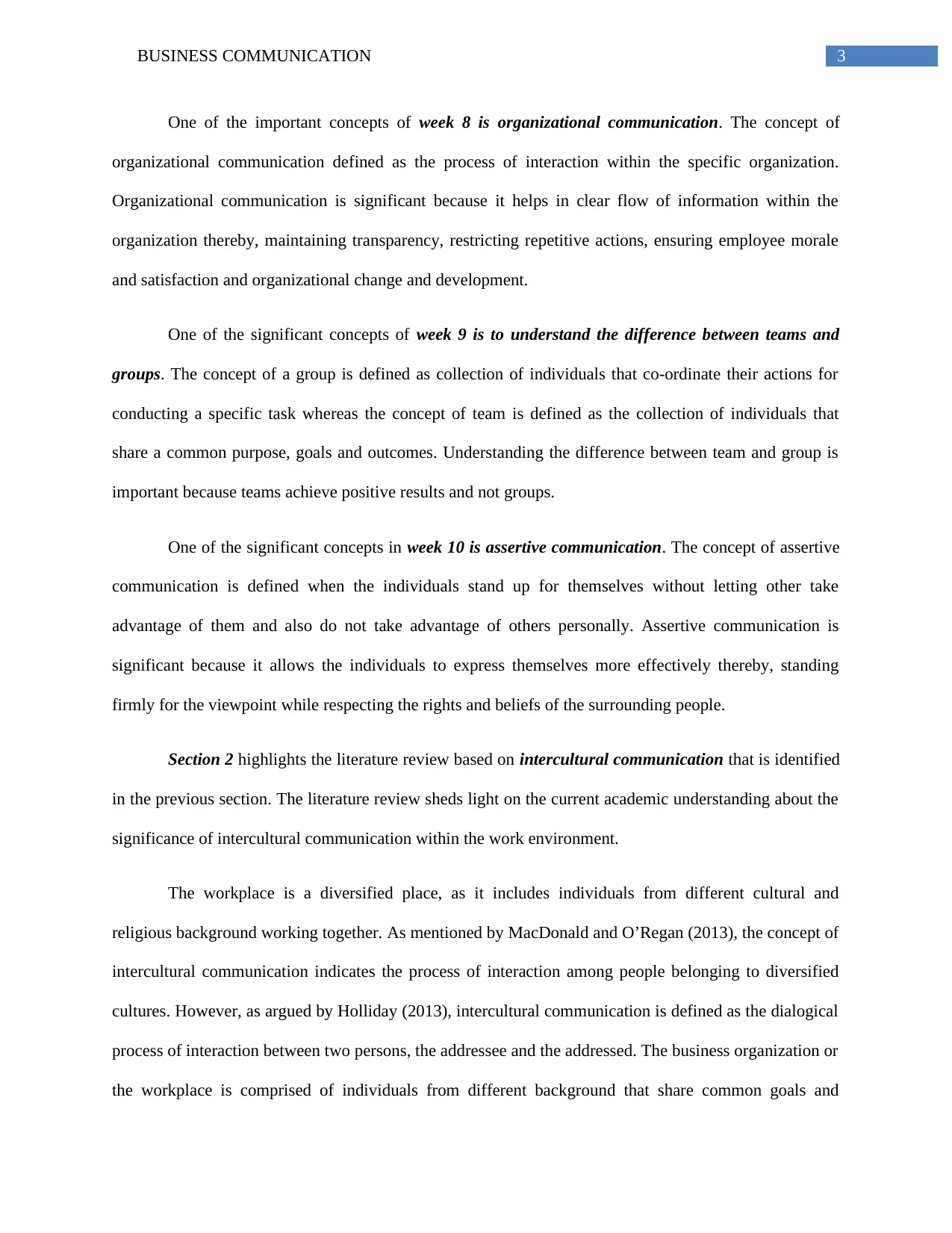
3BUSINESS COMMUNICATION
One of the important concepts of week 8 is organizational communication. The concept of
organizational communication defined as the process of interaction within the specific organization.
Organizational communication is significant because it helps in clear flow of information within the
organization thereby, maintaining transparency, restricting repetitive actions, ensuring employee morale
and satisfaction and organizational change and development.
One of the significant concepts of week 9 is to understand the difference between teams and
groups. The concept of a group is defined as collection of individuals that co-ordinate their actions for
conducting a specific task whereas the concept of team is defined as the collection of individuals that
share a common purpose, goals and outcomes. Understanding the difference between team and group is
important because teams achieve positive results and not groups.
One of the significant concepts in week 10 is assertive communication. The concept of assertive
communication is defined when the individuals stand up for themselves without letting other take
advantage of them and also do not take advantage of others personally. Assertive communication is
significant because it allows the individuals to express themselves more effectively thereby, standing
firmly for the viewpoint while respecting the rights and beliefs of the surrounding people.
Section 2 highlights the literature review based on intercultural communication that is identified
in the previous section. The literature review sheds light on the current academic understanding about the
significance of intercultural communication within the work environment.
The workplace is a diversified place, as it includes individuals from different cultural and
religious background working together. As mentioned by MacDonald and O’Regan (2013), the concept of
intercultural communication indicates the process of interaction among people belonging to diversified
cultures. However, as argued by Holliday (2013), intercultural communication is defined as the dialogical
process of interaction between two persons, the addressee and the addressed. The business organization or
the workplace is comprised of individuals from different background that share common goals and
One of the important concepts of week 8 is organizational communication. The concept of
organizational communication defined as the process of interaction within the specific organization.
Organizational communication is significant because it helps in clear flow of information within the
organization thereby, maintaining transparency, restricting repetitive actions, ensuring employee morale
and satisfaction and organizational change and development.
One of the significant concepts of week 9 is to understand the difference between teams and
groups. The concept of a group is defined as collection of individuals that co-ordinate their actions for
conducting a specific task whereas the concept of team is defined as the collection of individuals that
share a common purpose, goals and outcomes. Understanding the difference between team and group is
important because teams achieve positive results and not groups.
One of the significant concepts in week 10 is assertive communication. The concept of assertive
communication is defined when the individuals stand up for themselves without letting other take
advantage of them and also do not take advantage of others personally. Assertive communication is
significant because it allows the individuals to express themselves more effectively thereby, standing
firmly for the viewpoint while respecting the rights and beliefs of the surrounding people.
Section 2 highlights the literature review based on intercultural communication that is identified
in the previous section. The literature review sheds light on the current academic understanding about the
significance of intercultural communication within the work environment.
The workplace is a diversified place, as it includes individuals from different cultural and
religious background working together. As mentioned by MacDonald and O’Regan (2013), the concept of
intercultural communication indicates the process of interaction among people belonging to diversified
cultures. However, as argued by Holliday (2013), intercultural communication is defined as the dialogical
process of interaction between two persons, the addressee and the addressed. The business organization or
the workplace is comprised of individuals from different background that share common goals and
Paraphrase This Document
Need a fresh take? Get an instant paraphrase of this document with our AI Paraphraser
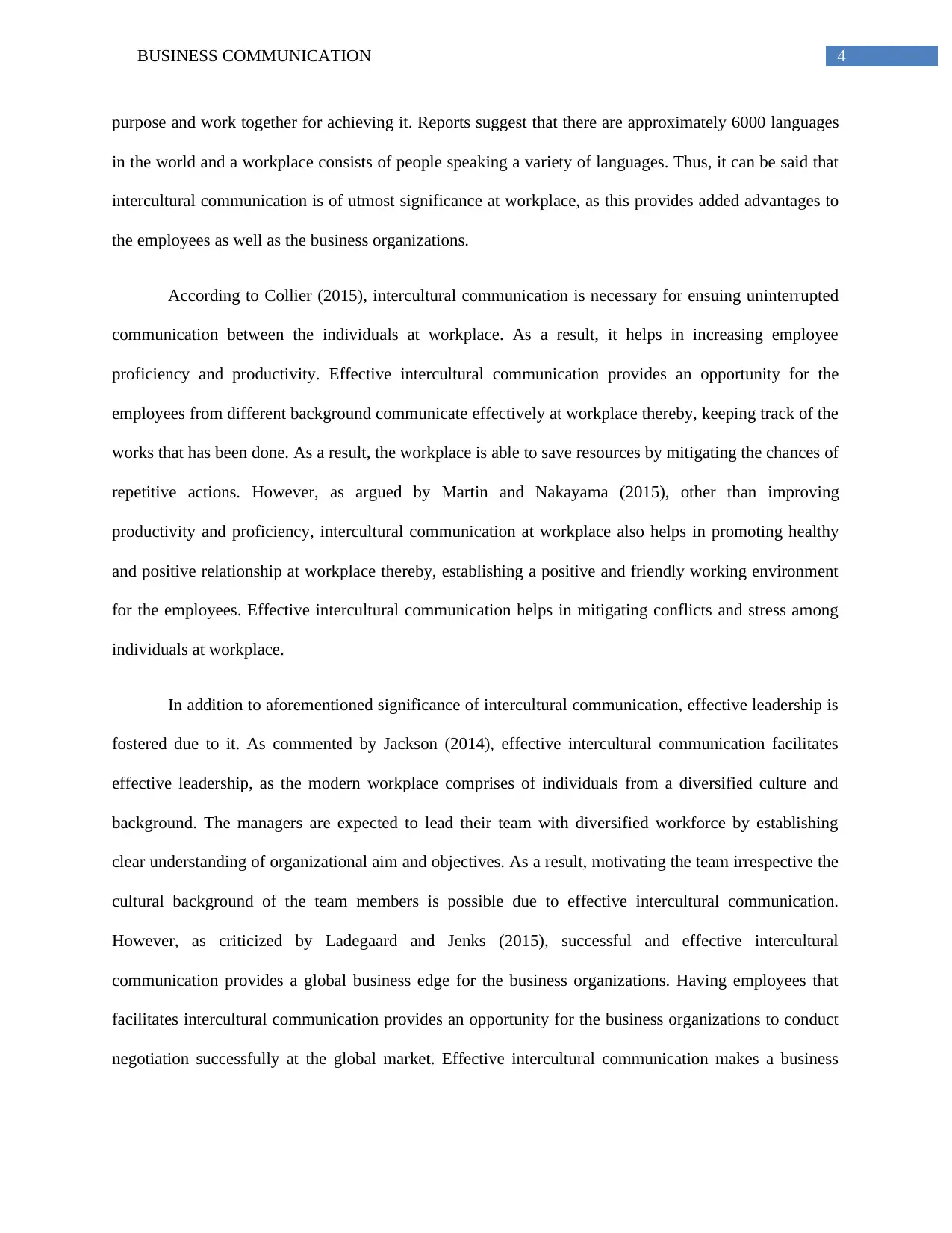
4BUSINESS COMMUNICATION
purpose and work together for achieving it. Reports suggest that there are approximately 6000 languages
in the world and a workplace consists of people speaking a variety of languages. Thus, it can be said that
intercultural communication is of utmost significance at workplace, as this provides added advantages to
the employees as well as the business organizations.
According to Collier (2015), intercultural communication is necessary for ensuing uninterrupted
communication between the individuals at workplace. As a result, it helps in increasing employee
proficiency and productivity. Effective intercultural communication provides an opportunity for the
employees from different background communicate effectively at workplace thereby, keeping track of the
works that has been done. As a result, the workplace is able to save resources by mitigating the chances of
repetitive actions. However, as argued by Martin and Nakayama (2015), other than improving
productivity and proficiency, intercultural communication at workplace also helps in promoting healthy
and positive relationship at workplace thereby, establishing a positive and friendly working environment
for the employees. Effective intercultural communication helps in mitigating conflicts and stress among
individuals at workplace.
In addition to aforementioned significance of intercultural communication, effective leadership is
fostered due to it. As commented by Jackson (2014), effective intercultural communication facilitates
effective leadership, as the modern workplace comprises of individuals from a diversified culture and
background. The managers are expected to lead their team with diversified workforce by establishing
clear understanding of organizational aim and objectives. As a result, motivating the team irrespective the
cultural background of the team members is possible due to effective intercultural communication.
However, as criticized by Ladegaard and Jenks (2015), successful and effective intercultural
communication provides a global business edge for the business organizations. Having employees that
facilitates intercultural communication provides an opportunity for the business organizations to conduct
negotiation successfully at the global market. Effective intercultural communication makes a business
purpose and work together for achieving it. Reports suggest that there are approximately 6000 languages
in the world and a workplace consists of people speaking a variety of languages. Thus, it can be said that
intercultural communication is of utmost significance at workplace, as this provides added advantages to
the employees as well as the business organizations.
According to Collier (2015), intercultural communication is necessary for ensuing uninterrupted
communication between the individuals at workplace. As a result, it helps in increasing employee
proficiency and productivity. Effective intercultural communication provides an opportunity for the
employees from different background communicate effectively at workplace thereby, keeping track of the
works that has been done. As a result, the workplace is able to save resources by mitigating the chances of
repetitive actions. However, as argued by Martin and Nakayama (2015), other than improving
productivity and proficiency, intercultural communication at workplace also helps in promoting healthy
and positive relationship at workplace thereby, establishing a positive and friendly working environment
for the employees. Effective intercultural communication helps in mitigating conflicts and stress among
individuals at workplace.
In addition to aforementioned significance of intercultural communication, effective leadership is
fostered due to it. As commented by Jackson (2014), effective intercultural communication facilitates
effective leadership, as the modern workplace comprises of individuals from a diversified culture and
background. The managers are expected to lead their team with diversified workforce by establishing
clear understanding of organizational aim and objectives. As a result, motivating the team irrespective the
cultural background of the team members is possible due to effective intercultural communication.
However, as criticized by Ladegaard and Jenks (2015), successful and effective intercultural
communication provides a global business edge for the business organizations. Having employees that
facilitates intercultural communication provides an opportunity for the business organizations to conduct
negotiation successfully at the global market. Effective intercultural communication makes a business
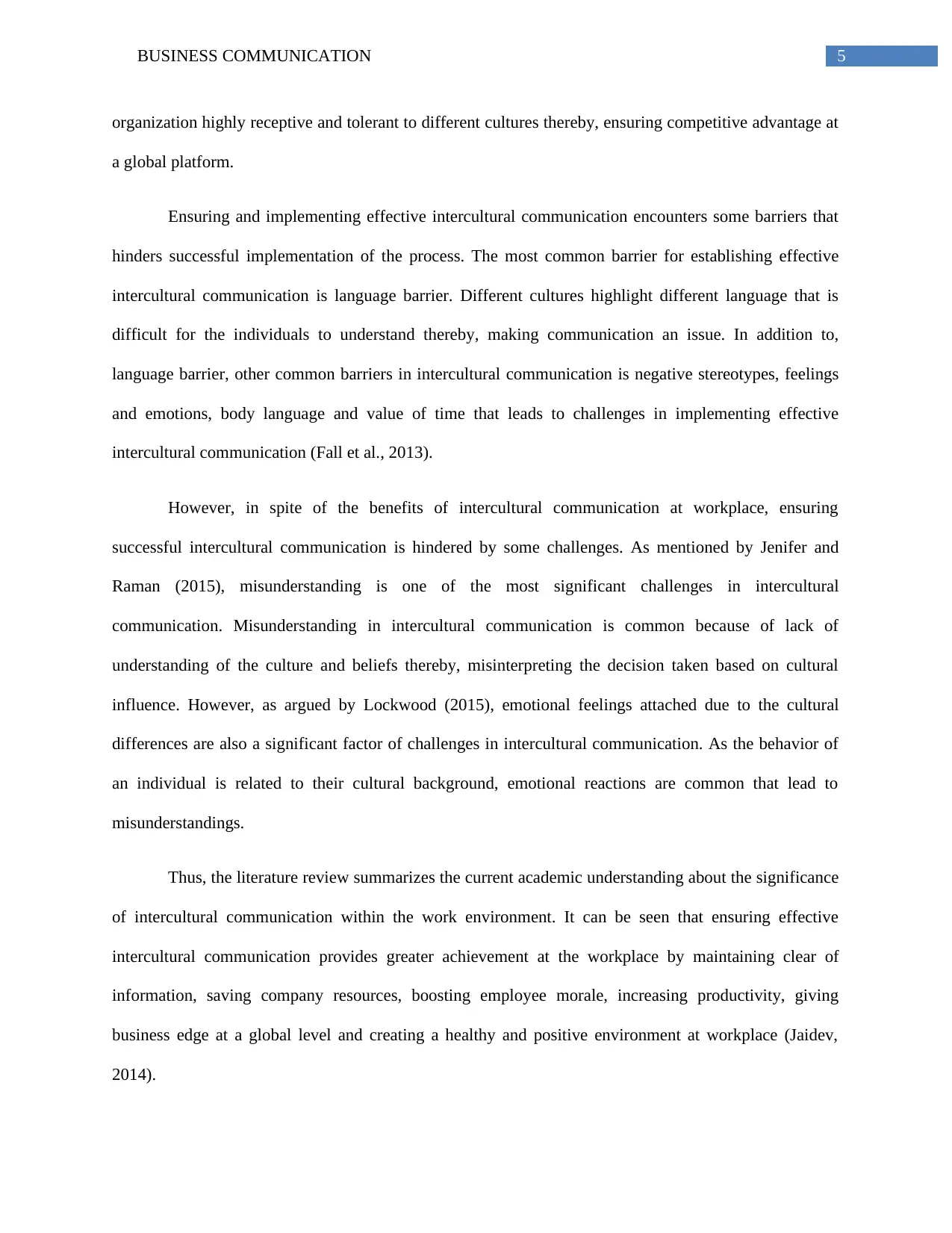
5BUSINESS COMMUNICATION
organization highly receptive and tolerant to different cultures thereby, ensuring competitive advantage at
a global platform.
Ensuring and implementing effective intercultural communication encounters some barriers that
hinders successful implementation of the process. The most common barrier for establishing effective
intercultural communication is language barrier. Different cultures highlight different language that is
difficult for the individuals to understand thereby, making communication an issue. In addition to,
language barrier, other common barriers in intercultural communication is negative stereotypes, feelings
and emotions, body language and value of time that leads to challenges in implementing effective
intercultural communication (Fall et al., 2013).
However, in spite of the benefits of intercultural communication at workplace, ensuring
successful intercultural communication is hindered by some challenges. As mentioned by Jenifer and
Raman (2015), misunderstanding is one of the most significant challenges in intercultural
communication. Misunderstanding in intercultural communication is common because of lack of
understanding of the culture and beliefs thereby, misinterpreting the decision taken based on cultural
influence. However, as argued by Lockwood (2015), emotional feelings attached due to the cultural
differences are also a significant factor of challenges in intercultural communication. As the behavior of
an individual is related to their cultural background, emotional reactions are common that lead to
misunderstandings.
Thus, the literature review summarizes the current academic understanding about the significance
of intercultural communication within the work environment. It can be seen that ensuring effective
intercultural communication provides greater achievement at the workplace by maintaining clear of
information, saving company resources, boosting employee morale, increasing productivity, giving
business edge at a global level and creating a healthy and positive environment at workplace (Jaidev,
2014).
organization highly receptive and tolerant to different cultures thereby, ensuring competitive advantage at
a global platform.
Ensuring and implementing effective intercultural communication encounters some barriers that
hinders successful implementation of the process. The most common barrier for establishing effective
intercultural communication is language barrier. Different cultures highlight different language that is
difficult for the individuals to understand thereby, making communication an issue. In addition to,
language barrier, other common barriers in intercultural communication is negative stereotypes, feelings
and emotions, body language and value of time that leads to challenges in implementing effective
intercultural communication (Fall et al., 2013).
However, in spite of the benefits of intercultural communication at workplace, ensuring
successful intercultural communication is hindered by some challenges. As mentioned by Jenifer and
Raman (2015), misunderstanding is one of the most significant challenges in intercultural
communication. Misunderstanding in intercultural communication is common because of lack of
understanding of the culture and beliefs thereby, misinterpreting the decision taken based on cultural
influence. However, as argued by Lockwood (2015), emotional feelings attached due to the cultural
differences are also a significant factor of challenges in intercultural communication. As the behavior of
an individual is related to their cultural background, emotional reactions are common that lead to
misunderstandings.
Thus, the literature review summarizes the current academic understanding about the significance
of intercultural communication within the work environment. It can be seen that ensuring effective
intercultural communication provides greater achievement at the workplace by maintaining clear of
information, saving company resources, boosting employee morale, increasing productivity, giving
business edge at a global level and creating a healthy and positive environment at workplace (Jaidev,
2014).
⊘ This is a preview!⊘
Do you want full access?
Subscribe today to unlock all pages.

Trusted by 1+ million students worldwide
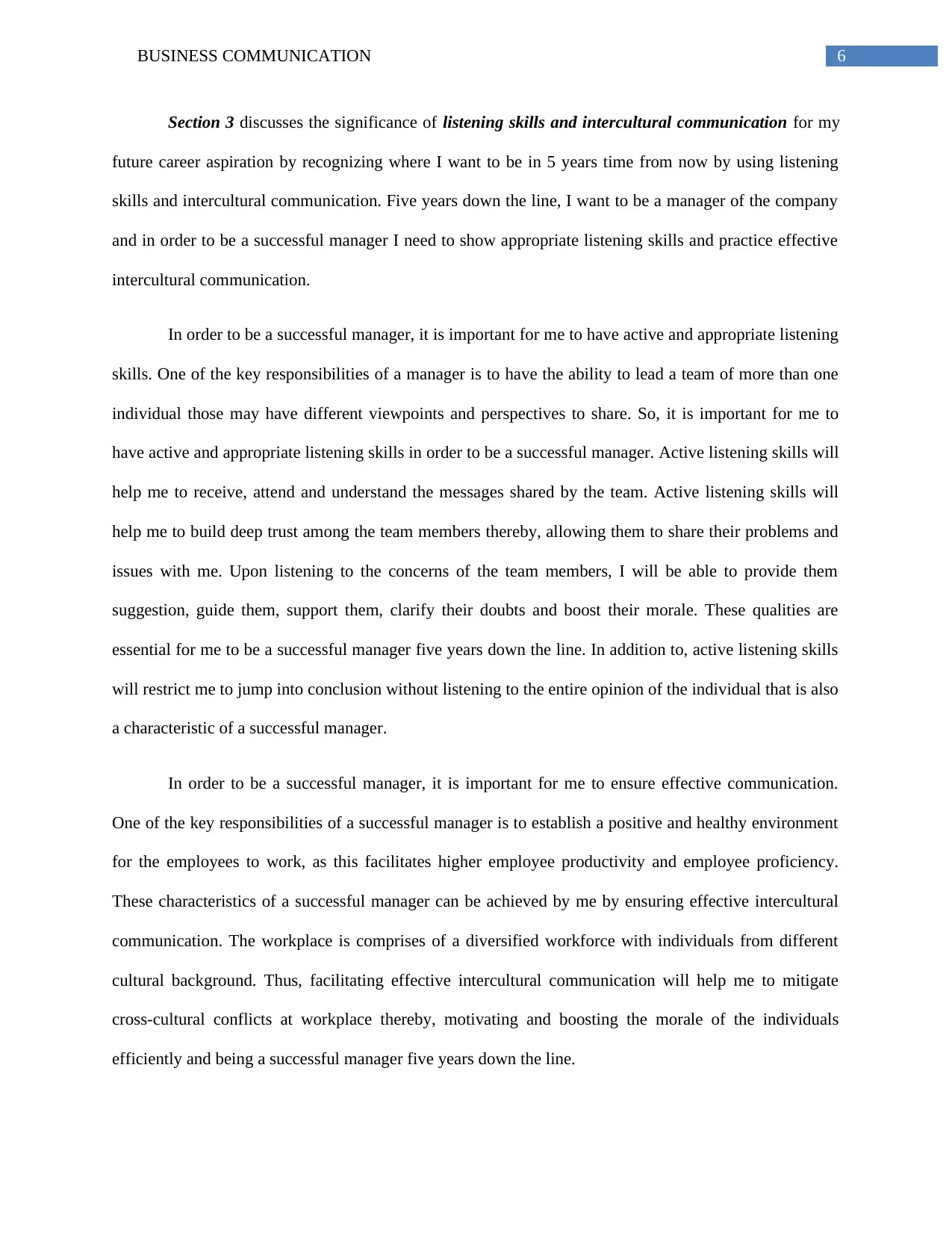
6BUSINESS COMMUNICATION
Section 3 discusses the significance of listening skills and intercultural communication for my
future career aspiration by recognizing where I want to be in 5 years time from now by using listening
skills and intercultural communication. Five years down the line, I want to be a manager of the company
and in order to be a successful manager I need to show appropriate listening skills and practice effective
intercultural communication.
In order to be a successful manager, it is important for me to have active and appropriate listening
skills. One of the key responsibilities of a manager is to have the ability to lead a team of more than one
individual those may have different viewpoints and perspectives to share. So, it is important for me to
have active and appropriate listening skills in order to be a successful manager. Active listening skills will
help me to receive, attend and understand the messages shared by the team. Active listening skills will
help me to build deep trust among the team members thereby, allowing them to share their problems and
issues with me. Upon listening to the concerns of the team members, I will be able to provide them
suggestion, guide them, support them, clarify their doubts and boost their morale. These qualities are
essential for me to be a successful manager five years down the line. In addition to, active listening skills
will restrict me to jump into conclusion without listening to the entire opinion of the individual that is also
a characteristic of a successful manager.
In order to be a successful manager, it is important for me to ensure effective communication.
One of the key responsibilities of a successful manager is to establish a positive and healthy environment
for the employees to work, as this facilitates higher employee productivity and employee proficiency.
These characteristics of a successful manager can be achieved by me by ensuring effective intercultural
communication. The workplace is comprises of a diversified workforce with individuals from different
cultural background. Thus, facilitating effective intercultural communication will help me to mitigate
cross-cultural conflicts at workplace thereby, motivating and boosting the morale of the individuals
efficiently and being a successful manager five years down the line.
Section 3 discusses the significance of listening skills and intercultural communication for my
future career aspiration by recognizing where I want to be in 5 years time from now by using listening
skills and intercultural communication. Five years down the line, I want to be a manager of the company
and in order to be a successful manager I need to show appropriate listening skills and practice effective
intercultural communication.
In order to be a successful manager, it is important for me to have active and appropriate listening
skills. One of the key responsibilities of a manager is to have the ability to lead a team of more than one
individual those may have different viewpoints and perspectives to share. So, it is important for me to
have active and appropriate listening skills in order to be a successful manager. Active listening skills will
help me to receive, attend and understand the messages shared by the team. Active listening skills will
help me to build deep trust among the team members thereby, allowing them to share their problems and
issues with me. Upon listening to the concerns of the team members, I will be able to provide them
suggestion, guide them, support them, clarify their doubts and boost their morale. These qualities are
essential for me to be a successful manager five years down the line. In addition to, active listening skills
will restrict me to jump into conclusion without listening to the entire opinion of the individual that is also
a characteristic of a successful manager.
In order to be a successful manager, it is important for me to ensure effective communication.
One of the key responsibilities of a successful manager is to establish a positive and healthy environment
for the employees to work, as this facilitates higher employee productivity and employee proficiency.
These characteristics of a successful manager can be achieved by me by ensuring effective intercultural
communication. The workplace is comprises of a diversified workforce with individuals from different
cultural background. Thus, facilitating effective intercultural communication will help me to mitigate
cross-cultural conflicts at workplace thereby, motivating and boosting the morale of the individuals
efficiently and being a successful manager five years down the line.
Paraphrase This Document
Need a fresh take? Get an instant paraphrase of this document with our AI Paraphraser
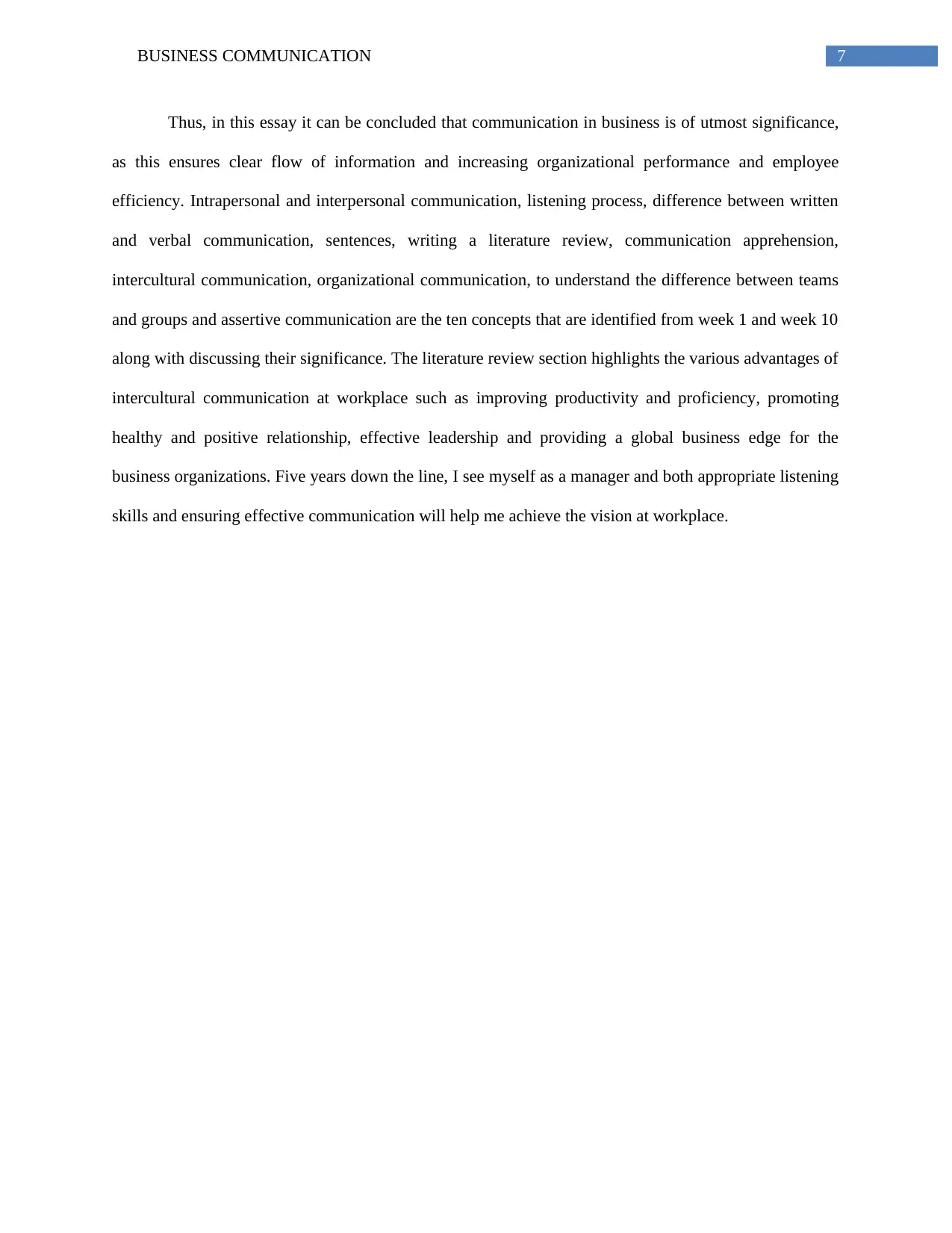
7BUSINESS COMMUNICATION
Thus, in this essay it can be concluded that communication in business is of utmost significance,
as this ensures clear flow of information and increasing organizational performance and employee
efficiency. Intrapersonal and interpersonal communication, listening process, difference between written
and verbal communication, sentences, writing a literature review, communication apprehension,
intercultural communication, organizational communication, to understand the difference between teams
and groups and assertive communication are the ten concepts that are identified from week 1 and week 10
along with discussing their significance. The literature review section highlights the various advantages of
intercultural communication at workplace such as improving productivity and proficiency, promoting
healthy and positive relationship, effective leadership and providing a global business edge for the
business organizations. Five years down the line, I see myself as a manager and both appropriate listening
skills and ensuring effective communication will help me achieve the vision at workplace.
Thus, in this essay it can be concluded that communication in business is of utmost significance,
as this ensures clear flow of information and increasing organizational performance and employee
efficiency. Intrapersonal and interpersonal communication, listening process, difference between written
and verbal communication, sentences, writing a literature review, communication apprehension,
intercultural communication, organizational communication, to understand the difference between teams
and groups and assertive communication are the ten concepts that are identified from week 1 and week 10
along with discussing their significance. The literature review section highlights the various advantages of
intercultural communication at workplace such as improving productivity and proficiency, promoting
healthy and positive relationship, effective leadership and providing a global business edge for the
business organizations. Five years down the line, I see myself as a manager and both appropriate listening
skills and ensuring effective communication will help me achieve the vision at workplace.
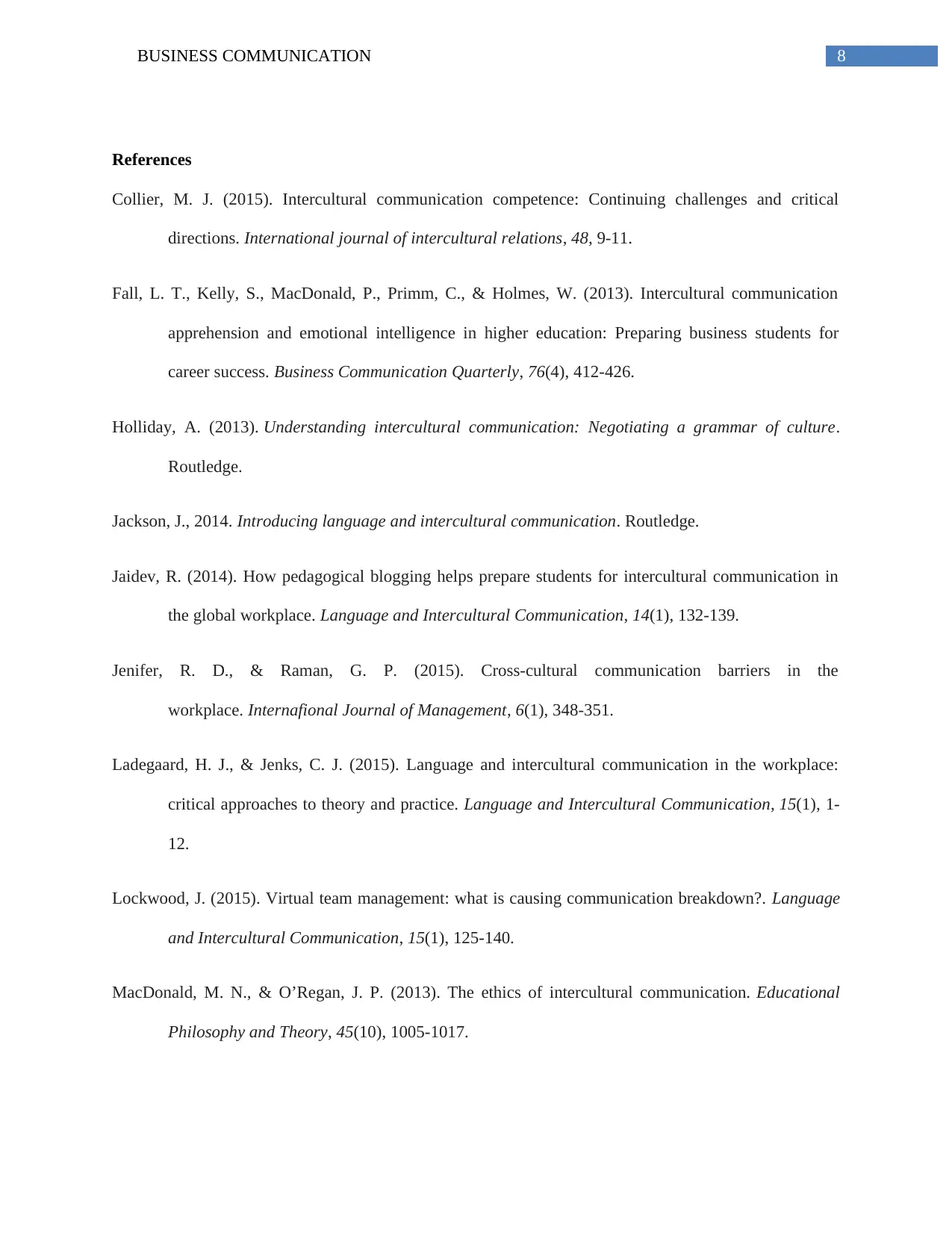
8BUSINESS COMMUNICATION
References
Collier, M. J. (2015). Intercultural communication competence: Continuing challenges and critical
directions. International journal of intercultural relations, 48, 9-11.
Fall, L. T., Kelly, S., MacDonald, P., Primm, C., & Holmes, W. (2013). Intercultural communication
apprehension and emotional intelligence in higher education: Preparing business students for
career success. Business Communication Quarterly, 76(4), 412-426.
Holliday, A. (2013). Understanding intercultural communication: Negotiating a grammar of culture.
Routledge.
Jackson, J., 2014. Introducing language and intercultural communication. Routledge.
Jaidev, R. (2014). How pedagogical blogging helps prepare students for intercultural communication in
the global workplace. Language and Intercultural Communication, 14(1), 132-139.
Jenifer, R. D., & Raman, G. P. (2015). Cross-cultural communication barriers in the
workplace. Internafional Journal of Management, 6(1), 348-351.
Ladegaard, H. J., & Jenks, C. J. (2015). Language and intercultural communication in the workplace:
critical approaches to theory and practice. Language and Intercultural Communication, 15(1), 1-
12.
Lockwood, J. (2015). Virtual team management: what is causing communication breakdown?. Language
and Intercultural Communication, 15(1), 125-140.
MacDonald, M. N., & O’Regan, J. P. (2013). The ethics of intercultural communication. Educational
Philosophy and Theory, 45(10), 1005-1017.
References
Collier, M. J. (2015). Intercultural communication competence: Continuing challenges and critical
directions. International journal of intercultural relations, 48, 9-11.
Fall, L. T., Kelly, S., MacDonald, P., Primm, C., & Holmes, W. (2013). Intercultural communication
apprehension and emotional intelligence in higher education: Preparing business students for
career success. Business Communication Quarterly, 76(4), 412-426.
Holliday, A. (2013). Understanding intercultural communication: Negotiating a grammar of culture.
Routledge.
Jackson, J., 2014. Introducing language and intercultural communication. Routledge.
Jaidev, R. (2014). How pedagogical blogging helps prepare students for intercultural communication in
the global workplace. Language and Intercultural Communication, 14(1), 132-139.
Jenifer, R. D., & Raman, G. P. (2015). Cross-cultural communication barriers in the
workplace. Internafional Journal of Management, 6(1), 348-351.
Ladegaard, H. J., & Jenks, C. J. (2015). Language and intercultural communication in the workplace:
critical approaches to theory and practice. Language and Intercultural Communication, 15(1), 1-
12.
Lockwood, J. (2015). Virtual team management: what is causing communication breakdown?. Language
and Intercultural Communication, 15(1), 125-140.
MacDonald, M. N., & O’Regan, J. P. (2013). The ethics of intercultural communication. Educational
Philosophy and Theory, 45(10), 1005-1017.
⊘ This is a preview!⊘
Do you want full access?
Subscribe today to unlock all pages.

Trusted by 1+ million students worldwide

9BUSINESS COMMUNICATION
Martin, J. N., & Nakayama, T. K. (2015). Reconsidering intercultural (communication) competence in the
workplace: A dialectical approach. Language and Intercultural Communication, 15(1), 13-28.
Martin, J. N., & Nakayama, T. K. (2015). Reconsidering intercultural (communication) competence in the
workplace: A dialectical approach. Language and Intercultural Communication, 15(1), 13-28.
1 out of 10
Related Documents
Your All-in-One AI-Powered Toolkit for Academic Success.
+13062052269
info@desklib.com
Available 24*7 on WhatsApp / Email
![[object Object]](/_next/static/media/star-bottom.7253800d.svg)
Unlock your academic potential
Copyright © 2020–2026 A2Z Services. All Rights Reserved. Developed and managed by ZUCOL.



